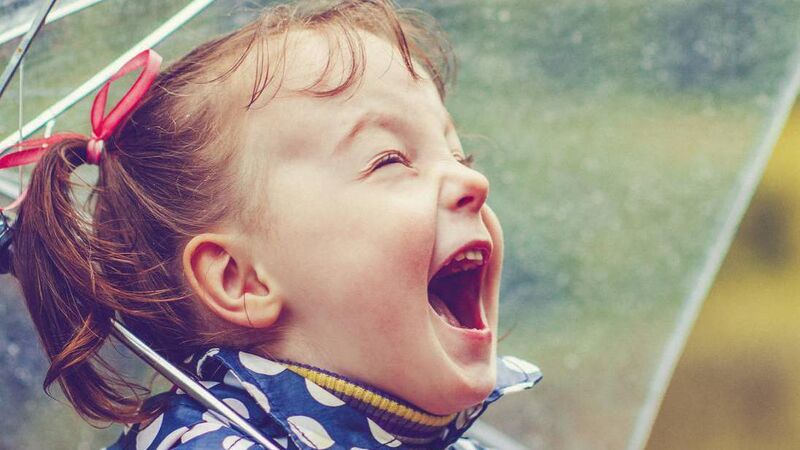Sweating the small stuff by allowing rain to ruin our day

Rather than let a rain shower ruin their day, kids usually see it as a bit of fun.
Sometimes, you just need a receptacle for your ire. It doesn’t necessarily matter that it’s not their fault. Rain sodden, the last thing you’re interested in is being reasonable.
Rain can be enraging. Don’t talk to me about motorists speeding past you and drowning you with splashes of rainwater close to the footpath. It probably makes my blood pressure rise.
But hang on, isn’t that an overreaction? To getting a bit wet? We’re in danger of sweating the small stuff when we allow rain to ruin our day.
I was reminded of a Tweet by RTÉ’s Sarah McInerney last week when she wrote that her little child stuck his tongue out in the rain – to catch a few drops.
What a wonderful response to finding yourself exposed to the elements but not allowing yourself to be annoyed. Rather, for that boy, rain on the tongue was probably a new experience. Instead of being cranky about the deluge, he was playful about it.
We can learn a lot from children when they experience the world in all its wonder (even in the bloody rain), refusing to be cowed by it, and resolutely not taking refuge in damaging suppressed anger.
You know the way children like to muck around in puddles of rainwater? That’s their playfulness, once again. Whereas anyone with a bit of sense would automatically associate stepping into a puddle with making their shoes leak and their feet wet, a kid just sees the possibilities for a bit of fun.
Children may not have much sense but they don’t see the world as a hostile place. Rather, the world offers up new things to learn.
“Why?” is the catch cry of every child, wanting to know why the earth moves and why they can’t go out in the rain.
Lucky for them, they’re probably too young to have their moods affected by the weather. Many of us, on the other hand, are martyrs to the vagaries of climate.
I spend an inordinate time looking up the weather forecast and trying to plan my life around it. Sometimes though, I force myself to carry on as normal, even when there’s a virtual tempest outside.
Now that we are exposed to extremes of weather thanks to climate change, we’re even more obsessed with the weather than we used to be. It really does have an impact on how we feel.
Cold weather gives our bodies the signal to hunker down and hibernate, resulting in less energy during the winter months. It’s a time for making soup and turning up the heat.
Warmer temperatures boost our energy – and mood – but only up to a threshold of 21 degrees. Beyond that, we can feel fatigued and have an urge to escape the heat.
We may be getting used to temperatures well beyond 30 degrees on foreign holidays, but that doesn’t make it any easier. We seek the shade and cool drinks when there’s a blazing sun.
Sunlight has an impact on energy. The light tells our circadian clock to remain awake while darkness tells our brain that it’s time to chill out and rest.
This is the time of year when there’s a tendency to succumb to SAD (seasonal affective disorder). Most people with this type of depression experience symptoms like sadness and sleepiness during the autumn and winter months.
Oddly, there are some people whose seasonal depression follows the opposite pattern. The warm, sunny weather of spring and summer triggers depressive symptoms while the colder months bring relief.
Depressingly, research has shown that the rising temperatures of climate change are linked to increasing levels of violence around the world.
As temperatures go up, stress, impulsivity and aggression rise. Droughts and crop shortages can also cause more competition for resources. Increased stress and aggression may play a role in more frequent collective violence, like riots and civil unrest. Temperature changes can contribute to interpersonal conflict, affecting interactions with strangers, partners and loved ones. It’s all a bit... well, depressing.
One thing’s for sure, there’s no avoiding eco-anxiety. I don’t know how children deal with it. I shudder to think how many ‘whys’ they utter when looking for explanations for the highly changeable weather.







 App?
App?




